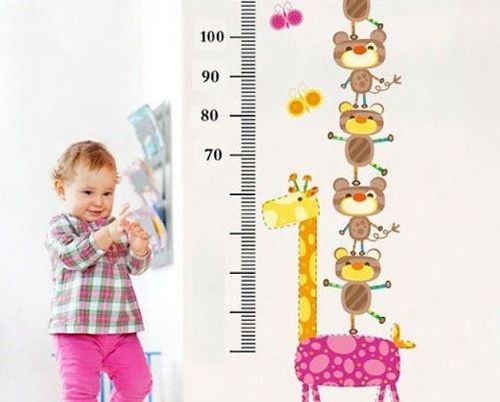This is an automatically translated article.
The article is professionally consulted by Master, Doctor Doan Ngoc Quynh Tram - Pediatrician - Neonatologist - Department of Pediatrics - Neonatology - Vinmec Nha Trang International General HospitalIn the first years of life, all issues related to the child's weight and height are of special concern to parents. Because these are considered indicators that directly reflect the development of young children. So how tall is enough for an 11-month-old boy?
1. How tall is an 11-month-old?
A baby's height is measured starting from the top of his head to the bottom of his heel. It is the same as an adult's height but the child's height is measured while lying down. The average height at birth for a full-term baby ranges from 45.7 to 60cm. Newborns grow from 1.5 to 2.5 cm per month from birth to 6 months and from 6 to 12 months infants grow on average 1cm per month.
How tall is the 11-month-old boy? The average height of an 11-month-old baby is about 74.5cm for a boy and 73cm for a girl. However, it's important to note that all babies are different and their birth weight may play a role in determining the weight or measurement around the 11-month mark. These numbers are averages only and children's heights may vary. Unlike weight, which is objectively measured by a doctor with a scale, a child's measured height can vary depending on who took the measurement and how active the baby was at the time. Sometimes, if a baby's length changes unexpectedly from one visit to the next, it could be due to a difference in the way it is measured.
So 11 months baby 70cm tall is not a problem of height retardation. Because length alone will not reveal whether a baby is healthy or not. Weight is also an important factor to consider, especially after birth many babies lose weight. The doctor will also consider other factors including gestational age and the baby's diet. Most healthy infants follow a similar pattern of development during the first year of life. Then, growth rates vary among infants and child length is generally not a good predictor of adult height.

Bé 11 tháng cao 70cm không phải là một vấn đề chậm phát triển chiều cao
2. Factors affecting the height of children
There are different factors that affect a child's height. Genetics plays an important role and children can be about the same height as their parents. However, this may not be immediately apparent and may take time to notice. Other factors that affect a child's overall height and size later in life include:
Nutrition: The consumption of healthy foods supports the growth of a child's height. Hormones: Some children may have hormonal imbalances and lead to slower or faster growth than their peers. Health: Some children with certain genetic conditions, such as Down syndrome, may be smaller than others. Medications: Certain medications, such as steroids, including prednisone, can slow a child's growth. In addition, 11-month-old babies will be more active, so their growth in height may slow down.
In summary, the average 11-month-old baby height is about 74.5cm for boys and 73cm for girls. It is normal for a baby's weight and height measurements to slow down as they become more active. So if there is any concern regarding the rate of growth in height or weight of the baby, seek the advice of your pediatrician. Because they will understand you and your child's situation best, from which they will give accurate advice or recommendations on changing nutrition and changing ways of caring for children to develop comprehensively.
For children to be healthy and develop well, it is necessary to have a nutritious diet in terms of quantity and quality balance. If children are not provided with adequate and balanced nutrients, it will lead to diseases of excess or lack of nutrients, which adversely affect the comprehensive development of children in terms of physical, mental and motor skills.
Children who do not eat properly are at risk of micro-mineral deficiency causing anorexia, growth retardation, malabsorption,... If they notice the above signs, parents should supplement their children with products. The supplement contains lysine, essential micro-minerals and vitamins such as zinc, chromium, selenium, and B vitamins to help fully meet the nutritional needs of children. At the same time, these essential vitamins also support digestion, enhance nutrient absorption, help improve anorexia, and help children eat well.
Parents can learn more:
Signs of zinc deficiency in children
Micronutrient deficiency and failure to gain weight in children
For more nutritional knowledge and child care for each age, parents please regularly visit the website vimec.com and make appointments with the leading doctors, pediatric specialists - nutritionists of Vinmec International General Hospital when needing advice on children's health.














